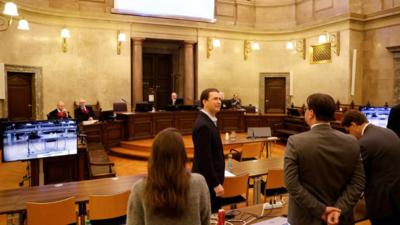Title: The Trial of Sebastian Kurz: A Pivotal Test for Political Integrity in Europe
The legal proceedings against former Austrian Chancellor Sebastian Kurz have sparked a significant upheaval within both the political and judicial arenas, potentially reshaping governance standards across Europe. Launched recently in Vienna, this high-profile case revolves around allegations of corruption and the improper use of public funds during Kurz’s tenure. As one of the youngest leaders ever to hold office in Europe, his rapid rise followed by a contentious trial has captured extensive media attention continent-wide. Beyond Austria’s borders, this trial prompts vital discussions about ethical leadership and accountability amid growing public distrust toward political institutions. This article delves into recent developments surrounding the case, its implications for Austria’s political landscape, and its broader significance for democratic trust throughout Europe.
Political Accountability Reimagined: The Ripple Effects of the Kurz Trial in Austria
The prosecution of Sebastian Kurz has sent shockwaves through Austria’s political sphere by bringing transparency issues and ethical governance under intense scrutiny. Accusations claim that millions were illicitly redirected from state budgets to enhance his party’s image during election campaigns—charges that strike at fundamental democratic principles. This widely covered investigation reflects an increasing demand among Austrians for tighter controls on campaign financing alongside elevated standards for elected officials’ conduct.
More than just a courtroom drama, this trial has ignited nationwide conversations about institutional reforms aimed at minimizing corruption risks. Central themes include bolstering protections for whistleblowers—essential actors who expose misconduct—and refining regulatory mechanisms to prevent conflicts between private business interests and public office responsibilities as seen elsewhere in European politics. Experts anticipate these debates could pave the way toward comprehensive legislative reforms designed to rebuild confidence through enhanced transparency and accountability.
Examining Evidence and Testimonies: Key Insights from the Kurz Court Proceedings
Throughout multiple hearings, statements from former insiders as well as independent analysts have been crucial in unraveling allegations against Kurz. Whistleblowers disclosed discrepancies concerning budget allocations earmarked for media contracts allegedly used to sway voter opinion prior to elections—a strategy comparable to sophisticated global advertising efforts but tainted here by accusations involving unlawful funding sources.
Financial audits presented during trials reveal alarming opacity regarding expenditures linked with campaign-related projects. Digital evidence—including emails and text exchanges—points toward coordinated attempts within Kurz’s inner circle to shape favorable media coverage while concealing financial transactions.
Below is a summary table highlighting principal figures referenced during testimonies:
| Year | Suspected Misused Funds (€) | Main Spending Areas |
|---|---|---|
| 2017 | 1,200,000 | Media Advertising Contracts |
| 2018 | 850,000 | Election Campaign Events & Promotions |
| 2019 | 600,000 | Public Relations & Outreach Initiatives |
This intricate web challenges judicial authorities not only to separate fact from politically charged narratives but also raises broader concerns about maintaining integrity within Austrian politics.
Strengthening Transparency in Political Financing: Proposed Legislative Measures Inspired by the Trial
The disclosures emerging throughout Sebastian Kurz’s trial highlight an urgent necessity to overhaul how electoral campaigns are funded—not only within Austria but potentially across European democracies—to protect democratic processes against undue influence.
Key reform proposals include:
- Total Disclosure Requirements: Mandate immediate public reporting of all donations regardless of amount.
- Laws Limiting Donation Sizes:
- An Independent Oversight Body:
- Diversified Public Funding Systems:
- Capping Campaign Budgets:
- Civic Awareness Programs:
These measures aim not only at preventing future abuses but also restoring public trust shaken by recent scandals involving prominent figures like Kurz.
Future Outlook: Wider Implications of the Kurz Trial on European Democracy
In conclusion, Sebastian Kurz’s ongoing legal challenge transcends personal responsibility; it epitomizes a critical juncture where European democracies must confront opaque funding practices intertwined with modern political complexities. As court decisions approach—with verdicts anticipated later this year—the repercussions will likely extend beyond Austrian borders influencing continental debates over governance reforms.
Global observers remain attentive as judicial outcomes may redefine expectations surrounding leadership ethics while shaping efforts aimed at rebuilding eroded trust between governments and their citizens amid rising populist movements across Europe.
Stay connected as we continue delivering updates on this landmark case that is redefining Europe’s commitment towards transparent governance today—and into the future.
















